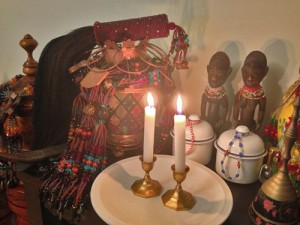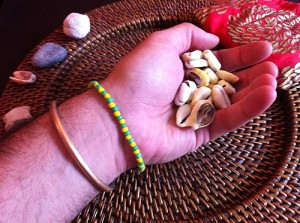
Two candles offered to the Ibeji at the Santeria Church of the Orishas.
One of the most common questions I receive through our church’s Facebook page and through our Contact Us page is some variation of “How do I learn Santería?” Indeed it seems to be one of the most challenging questions to get a straight answer on, but I am going to give you the answer I would give a godchild. Hopefully each of you who are interested in learning the religion of Santeria will find your own way to the right person. Before I go into my answer, however, I must preface everything I write here with one bit of information. The Santería Church of the Orishas does NOT give out any referrals to priests outside of our local area (Los Angeles, CA) and we cannot refer you to anyone outside of our lineage. Please do not reply to this article seeking a godparent. That is not the intent of this article. The intent is to educate the public on the right way to learn; it is then up to you to find the right godparent.
Santeria Lukumi is a Communal Religion
In order to understand the way you learn Santeria, you must understand the history of our faith and our culture – for the two are largely indivisible. Santería Lukumí came together on the island of Cuba as the aggregate worship of the various Yoruba-speaking people from different tribes, along with elements of Arará worship, Catholicism and Spiritism. For many generations it was protected and kept secret – as something solely for African people. But over time, African people and European people began to have children of mixed ancestries and as such, the doors to Lucumí slowly (and reluctantly for many people) opened to non-African participants. But even then, the practice of Lucumí was something you did because your family did it. It was tribal – and in many families it continues to be tribal. At its core, Santería Lucumí is NOT an individual practice, is not a personal path, and is something you inherit and pass on to others as elements of a culture that survived the tragedy of slavery in Cuba. You learned Santería because it was what your people did. You practice Santería with others in the community, because it serves the greater whole.
Learning Santería Lucumí in the Information Age
With the advent of the internet and mass social media, communication has become easier than ever. More and more people have discovered Santería Lucumí and are attracted to the orishas. But sadly, many people bring with them an American, fast-paced culture of instant results and quick fixes. This clashes with the traditional Lucumí way of learning. This has resulted in many people gobbling up information on websites and through books that are poorly-informed at best, or damagingly misleading at worst. Some have taken to “worshipping” in their own invented manner, often grafting the Orishas onto neo-pagan traditions like Wicca, or utilizing the orishas like a table of correspondences when performing candle spells or folk magic spells. Still others approach the religion thinking “I WANT TO BE INITIATED!” Not realizing that initiation into Santeria is something that is marked through divination because you need it, not because you want it. There are many scoundrels and charlatans who have taken advantage of this generation of American-cultured people by offering sham initiations through the internet, or mail-order orishas, or a multitude of culturally appropriated products that steal the imagery, symbolism and religious elements of Santeria Lucumí outside of a cultural or traditional religious context. That is why our church founded SAFE – Santeros Against Fraud and Exploitation – in order to educated the public about what is traditional, legitimate practice and what isn’t. To be forewarned is to be forearmed. In spite of the wave of cyber-fraud and poorly educated priests touting themselves as experts behind an internet-devised persona, there are still many lineages and houses that practice the proper way, training people in true apprenticeship, with the utmost of ethical integrity.
So How Do You Learn Santería Lucumí?
Learning Santeria is a process that requires true apprenticeship. That means learning side-by-side from your godparent, following what they say, and doing what they do. If you talk to a multitude of Santeros each godfamily will have minor variations on how things are done and you will simply confuse yourself and get frustrated. Stick to one spiritual lineage and one godparent and take things slowly. Here are a few things you’ll need in your process of learning Santería Lucumi:
Select a Godparent
The first thing you must do to learn Santería Lucumí is that you must find a godparent. This can be a man or woman who is initiated as an Olorisha in the religion. A Babalawo may be able to help you with life problems, but he will not be able to give you the required elements to proceed in the religion beyond the limited few that a Babalawo can give (Hand of Orunla, Idé of Orunla and Ifá warriors – he cannot crown you with an orisha like Chango, Eleggua, etc. He can only initiate others to Ifá as babalawos.). I highly recommend that you take your time before you dedicate yourself to one priest or priestess as your godparent. Take a few months and get to know that person – the longer the better – before you jump into receiving any initiations from him or her. I also recommend you work with ONE PERSON AT A TIME. Do not “shop” several olorishas at a time. That is highly disrespectful and insulting. Our religion is a practice of discipline and respect, not one where you select a godparent based on the lowest bidder. Learn from one olorisha, and if you find they are not a good match, formally end the relationship with them before going to find another one. You can’t have your feet in two different camps at the same time.

Divination with diloggún is one of the best ways to learn where you are on your path to destiny.
Get Readings With Your Godparent
One of the first things you should do is to get a diloggún reading (or an Ifá reading if you are part of an Ifá house) from your godparent, or a diviner that they trust. The reason I recommend a diloggún reading is that you will be communicating with the orishas themselves – not with spirits of the dead or someone’s intuition. A spiritist mass (misa espiritual) is not a suitable alternative to a diloggún reading! The orisha Elegguá will tell you what your destiny is and where your path in the religion lies. The religion – as much as you may love it – might not be the right place for you, and a diloggún reading will tell you as much. It will also tell you if you need to be initiated or not (for those folks who come wanting to know if they can be initiated). Not everyone has a destiny that includes initiation! But the reading will give you a clear understanding of our working relationship with the orishas in our faith, and also expose you to our divination systems, and the technology of ebó. Additionally, I’ve found that watching an olorisha’s divining style says a lot about how they function as a godparent. Are they taking time to give you guidance on how to make the most of the sign that comes out in the reading? Are they giving you positive and negative elements to the sign or are they simply giving a “doom and gloom reading?” Are they trying to find simple ebós to do to remedy your situation or are they immediately jumping to sacrificing the entire barnyard of animals? Are they pushing you into doing an initiation you don’t want to do, or are they simply prescribing the initiation and telling you that it would be in your best interest – then letting you decide in good time? These are all things to watch out for in a divination.
Ask Your Godparent Questions
Do you have a question about something you don’t understand in our religion? Ask your godparent! As tempting as it might be, don’t go looking for answers on internet discussion boards and websites (yes I see the irony of that statement). We have a saying for those places: “In the town of the blind, the one-eyed man is king!” Most people on internet discussion boards are half-educated or think they know a lot because they have 5 years of initiation. There are masters in our religion with over 40 years of initiation and actual experience in an igbodú (sacred ocha room) that you could be asking who will have your answer and the history behind it! But you have to ask them in-person. A website is no replacement for in-person learning. Always ask the person to whom you have entrusted your training – your godparent! Always verify things you read online by confirming them through your godparent, as there are variations from lineage to lineage within our religion. Save up a list of questions and their answers in a notebook. I used to do that, and while it did drive my godparent crazy, in the end I was glad for it. Those answers proved to be precious jewels of information that so few others actually had access to. Ask your godparent’s elders (if they are around) to see if they can elaborate on the situation – just ask your godparent first so you don’t seem to be jumping over his/her head.
Remember the most important question of all: “Why do we do that?” All too often priests and priestesses in our religion learn by copying what others do, and never learn why we perform ritual actions in a certain manner. All of our ceremonies, our songs, our rituals, our offerings, our prayers and our traditions are encapsulated in odu (the signs of the diloggún divination system). There is a reason for why we do things, and often times, once you understand the reasons for our actions, the ritual actions are even easier to remember. You can also weed out an Olorisha’s personal superstitions and style from the actual practice of Santería by doing this. Also remember there is a time and place for everything. Stopping your godparent in the middle of a ceremony to ask why they are doing something is not usually a good idea. It is best to wait until there is a break in the ceremony or until the ceremony is done and quietly pull your godparent aside and ask them why ritual actions were done. That way your godparent can focus on completing the ebó or ritual and not get sidetracked with questions. Also, some godparents do not like to be questioned in front of their peers, and this method preserves the respect between godchild and godparent. Questions are best asked in private to avoid problems.
Apprenticeship is How You Truly Learn Santería
Santería Lucumí is traditionally learned through true apprenticeship, not in sit-down classes. This means that as a newcomer to the religion, you learn the most menial of tasks first: taking out the trash, plucking chickens, sweeping, washing dishes, mopping the floor, etc. What you should be focusing on is the sanctity found in service toward others. If no one takes out the trash the ritual won’t be able to proceed. Your role as the trash guy is just as critical as the Oriaté’s role in singing the songs of the ritual. Take pride in a job well done even if you’re just plucking chickens, for it is in humbling ourselves to serve that we learn what communal religion really is about. It’s not about titles and ego, it’s about love, community and service. While you are performing chores, listen attentively to the conversations taking place around you. You will absorb information about past rituals, information about odu, historical accounts of old Santeros and Santeras and how they used to do things, and THAT is how you start to learn in the religion. Gossip less, and learn more by listening while doing chores! Offer to do the things no one likes to do, or by watching. Stand next to the butcher and watch how he or she opens the animals so that you can learn how to do it. Offer to crack open coconuts and remove the meat from them, and you’ll learn a few tricks from older olorishas. Offer to clean up the area outside dedicated to feeding the dead, and set it up with its offerings of drinks and food. You’ll learn a lot about how to propitiate the ancestors in the process. Sit side-by-side in readings (if your godparent permits it) so that you can begin to understand the mechanics of a diloggún reading, and if you have questions ask your godparent after the reading is done to better understand how it works. This is the meaning of true apprenticeship and it is how we learn to practice Santería Lucumí.
Keep a Professional Relationship With Your Godparent
One of the common mistakes of newcomers to the religion is that they want to create a personal and friendly relationship with their godparent. I do not recommend this. I find that this crosses certain lines and can actually cause friction between godchild and godparent. I’ve found in my own life as a godchild and as a godparent that the best way to keep the relationship between godparent and godchild healthy is to keep a healthy professional distance between the two of you. Offer to help your godparent, reach out to them regularly so that you can know when events are taking place and see if you can attend them, but do not spend personal and casual time together like buddies. This can actually cause there to be resentment, spreading of gossip and misunderstandings about expectations. This also helps prevent unethical behavior from happening on either side of the fence.
“You Can’t Know That Until You Are Initiated!”
Santería Lucumí is an initiatory religion and many of its aspects are secret. The contents of our ceremonies and some of the deeper rituals we perform are secrets that are not given to those who are uninitiated. It is normal to be told by your godparent that they cannot answer your question until you’ve been initiated as an Olorisha and been presented to the Igbodú (sacred room). Do not despair, there are still plenty of things you can learn before initiation. If you have not yet received any initiations, it is best to focus your learning on understanding the structure of the godfamily, getting to know people in your godfamily and learning general information about the religion. Learn the best ways to do all of the chores in the religion: trash, washing dishes, opening coconuts, plucking chickens, etc. Also learn about the orishas: their likes and dislikes, what forces of nature they have dominion over, their colors, numbers, patakís (legends), etc. Start to build relationships with the orishas through offerings of addimús, fulfilling ebós with your godparent’s guidance, and learning their songs and dances. Going to drum ceremonies are a good way to learn the songs and dances too.
Work With Your Ancestors
The first place most newcomers to Santería begin their devotions is with their personal ancestors. Everyone has access to their ancestors, whether it is through the traditional Lucumí shrine that is placed on the ground, or through Espiritismo and the bóveda. The best thing a new aleyo can do is to start by developing a relationship with their ancestors, guides and spirits as well as learning how to listen to their guidance. This is where having a godparent is important, as they can guide you and show you how to communicate with the ancestors and how to make proper offerings to them. Most newcomers will participate in spiritist masses (misas espirituales) as a way to develop their mediumship skills and build relationships with their guides, under the tutelage of their godparent as well.
Keep An Open Mind
As you learn and grow in Santeria you’ll run across other adherents of the faith and invariably you’re going to learn about varying practices and seeming contradictions in the way people follow our faith. It’s important to keep an open mind and not judge others in the process of learning. It’s easy to paint things in black and white but until you’ve been fully initiated in the religion and know the inner workings of our ceremonies, it’s going to be hard to discern what is legitimate variances in practices versus what is misinformation or fraudulent practices. One of the best things you can do is take any information you gather back to your godparent for verification and explanation. Then stick to the way things are done in your god-family. You’ll grow in your community, learn and form respectful bonds with your god-family. As you make your way in Santeria you’ll see just how best to function as a tribe, how to honor the ancestors, the orishas and your family through your actions and in how you conduct yourself in life.



 Pagan Blog Project
Pagan Blog Project
6 pings